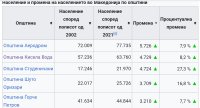The native population of Japan is falling at a rate of almost 100 people an hour despite intensified efforts by the government to raise the nation’s low fertility rate.
According to official data released on Friday, the number of Japanese nationals dropped by the biggest amount in a year since comparable records began in 1950 — a fall of 837,000 in the 12 months to October 1 2023.
That decline represents a daily drop of 2,293 people, or just under 96 per hour.
The same report, published by the Ministry of Internal Affairs and Communications, showed Japan’s overall population was 124.3mn in October — down 595,000 from the previous year when adjusted for steadily rising levels of migrant workers, overseas students and foreign permanent residents.
In a report released last year, the country’s Immigration Services Agency said the number of foreign nationals living in Japan had reached a record high of 3.2mn at the end of June 2023. The increase was driven by expansion in a visa programme for skilled workers in specified sectors and in technical internships.
The record drop in the number of Japanese nationals marked the 13th consecutive year of decline for a nation that has led the developed world in population contraction and ageing, and whose demographic patterns are increasingly being followed by other nations in Asia and beyond.
Japan’s latest population numbers followed the release in February of a preliminary tally of the number of babies born in 2023: a record low of 758,631, down 5.1 per cent from the previous year.
In its most recent forecasts, Japan’s National Institute of Population and Social Security Research (IPSS) had expected the number to fall to 755,000 by 2035, suggesting the rate of decline is now far quicker than expected.
The latest data adds to an already very top-heavy population pyramid, with historic distortions at both ends. The number of under-15s in Japan is at a record low of 11.4 per cent of the overall population, while the number of over-65s is at a record high of 29.1 per cent.
The numbers represent the latest shock in a long-term demographic crisis that Japan’s Prime Minister Fumio Kishida has said has taken the country to “the brink of being unable to maintain social functions”.
Kishida’s comments accompanied the release last year of a package of measures aimed at encouraging families to produce more children by reducing medical, educational and other costs — upgraded versions of previous policies that have so far failed to reverse the long-term trend of fertility decline.
Also on Friday, the IPSS produced a bleak outlook for the future of Japanese households as families become smaller and the population of unmarried elderly people balloons.
The forecasts noted that Japan’s average household consisted of 2.21 people in 2020 and was on track to fall below 2.0 in the year 2033 as living alone increasingly became the norm.




























